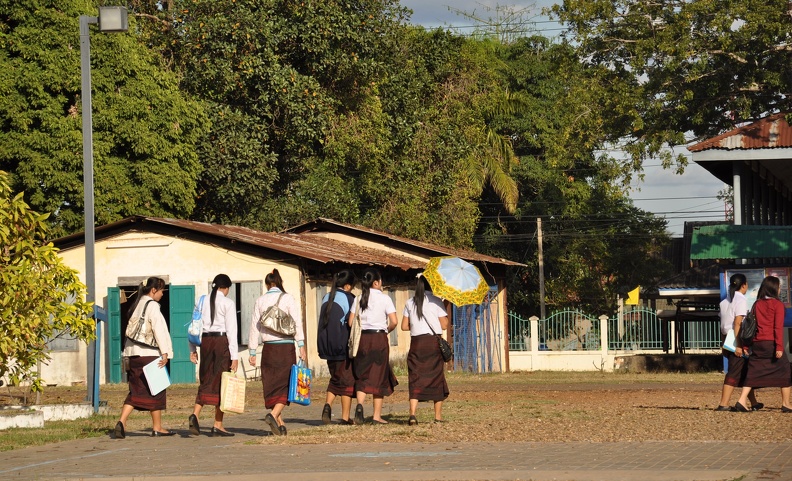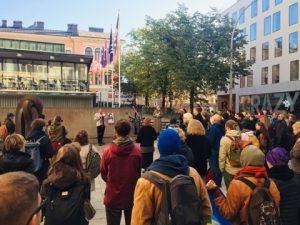by Anna Heikkinen
(The following is a repost from Anna’s blog; the original post can be found here)

Children sitting in front of the glacier Huaytapallana in the Natural Reserve of Junín, in the Central Andes of Peru.
By July, the Mantaro River Valley had turned all yellow. The transition had happened slowly. One morning I was standing on the terrace of my appartment in Huancayo, looking at the surrounding mountains. All that had been covered with different shades of green when I had arrived few months ago, had now transformed into dry, lifeless colors of yellow.
It had not rained for weeks. Last time it rained, it came down as a furious thunderstorm. In the mountains, the thunderstorm feels so powerful. It seems to be born behind the mountains, crawling slowly on the top of the mountain peaks and then spreading its anger down by the slopes to cover all the valley. The sound of the thunder runs through your bones. The concentrated energy in the air makes your body shake. At the peak of the thriller – the sky breaks down and bursts out an outrageous rain that can last for hours.
The thunder scenery is magical and scary at the same time. You feel so tightly connected to the power of nature and realize that at the end, it will always be superior to you.
In the Andean cultures, it is believed that humans, animals and nature are all one and that there are no divisions between these Earth Beings. If Pachamama, the Mother Earth is hurt, all the beings will go through its suffering. When you go walking to the highlands, before taking off you make a short ceremony for Apus, the mountain God. It is considered as a kind gesture to ask Apus for its permission to visit its mountains and for its protection for your journey. Nature, with its all different Earth Beings are valued and treated with respect.
In the Andean cultures, it is believed that humans, animals and nature are all one and that there are no divisions between these Earth Beings. If Pachamama, the Mother Earth is hurt, all the beings will go through its suffering.
On a one crispy Saturday morning in July – an expedition crew consisting of me, Dr. Armando Guevara Gil and our friends Don Cirilo and Don “Chalaca” from a nearby local community of Santa Rosa de Ocopa – was heading to explore highland lakes feeding the Achamayo River.
The red shades of sun were rising behind the mountains as our car was slowly climbing uphill on a rocky serpentine road. As we got higher, we could see the grass covered with white sheet of frost and feel in our lungs how the air had become freezer to breath.
A clear sun light was shining on our path as we began our walk surrounded by the sceneries of endless puna. The frozen grass was shuffling under our feet and the small mountain flowers growing tightened to the ground were waking up. We could hear echoes of dogs barking somewhere far away. Cirilo told that they came from the alpaca-herds’ camps.

Expedition crew in the highland punas of the Achamayo River Valley.

By the lake Taptapa with Don Cirilo and Don Chalaca. Photo: Armando Guevara Gil.
We had sat down by the lake Chaluacocha to have some snacks when suddenly the sky turned all grey and a snappy gust of snow began to whip the ground. Our local friends said teasingly that Pachamama had gotten angry because we had been so eager to head to the punas that we had forgotten to make the payment to Pachamama.
In the middle of the snowstorm, we decided to make a short ceremony, sharing some of our fruits and bread with Pachamama. Don Cirilo gave a short speech to ask for good weather and thank Pachamama to permit us to visit its lands, lakes and mountains.
Ten minutes later the sky started to brighten and the snow was gone. We were joking that our presents had managed to calm down the anger of Pachamama.
“Rationally thinking” our little ceremony probably did not have the power to change the weather. But it forces you to reflect upon, how we tend to forget that after all, we are all just shortly passing visitors in our common home – the Earth. And the least we should do is to show respect and gratitude to our host.

Having a rest in between walking with Don Cirilo. Photo: Armando Guevara Gil.
Drastic changes in weather is not something uncommon in the highland punas, located in the altitude of 5,000 m above sea level. In the highlands, the flow of air is influenced by the mountains. This can cause rapid changes at micro scale. Though, Don Cirilo and Don Chalaco told us that it was quite rare that it would rain or snow at this time of the year.
In the Peruvian Andes, there have typically been very marked shifts between rainy and dry periods. Usually it rains regularly between December and April whereas from May onwards until November the rain remains almost absent.
For centuries, the farmers in this region have been used to live, sow and harvest according to these shifts. Now the regular climate patterns are changing. The highland farmers that interviewed, told me that they didn’t know anymore when they should sow or harvest. In recent years, their yields had often been destroyed due to lack or excess of rain. Last year in many parts of Mantaro River Valley, the farmers had lost their entire harvest due to harsh night frosts. As one farmer put it: “farming in the highlands has become a risky business.”
The way people in the highlands describe their environments and farming practices is often almost poetic. They would often tell me how “my little corn is suffering from the burning sun” or “our poor river is dying”. When I was asking, what does water mean for the communities, a very common answer was as the following one: “without water we cannot live, neither our cows, without water everything dies.”

A farmer and the cattle in the community of San Jose de Quero.

The Cunas River flowing through the community of Usibamba.
These conversations reveal the relationship the highland communities have with the nature. Natural resources bring literally bread to their table. But nature for them is more than just a livelihood. It is a way of living and a way of being in a coexistence with and by the rules of the nature.
Last year in many parts of Mantaro River Valley, the farmers had lost their entire harvest due to harsh night frosts. As one farmer put it: “farming in the highlands has become a risky business.”
Unlike us – sipping our cappuccinos comfortably in a cozy café and speculating the latest scientific findings about rising temperatures or melting glaciers somewhere far away – for the Andean farmers, climate change has become an everyday reality. They feel the burning sun on their faces while working the whole day in their chacras, sowing corn, potato or quinoa. They wait desperately for the rain for their plants to grow. And hope that the unexpected rains won’t burst to ruin their harvests left on the fields to dry.
Besides the changing climate narratives of the local people, physical studies show that the climate in the Mantaro River Valley has changed in the last decades. Just as people told me about “plants burned by frosts or sun” or “the insane rains” – the climate studies indicate clear evidence of declining rain, rising temperatures and more frequent extreme weather events.
Scientists have also found that climate change is deepening the inequalities between the poor and wealthy nations. Countries in the so-called global south, that have contributed least in global warming are the ones who are now suffering the biggest economic losses caused by it. At individual level, the poor are often the most vulnerable to climate change due to lack of resources or living in ecologically and politically fragile regions.
It is paradoxical, that those who least exploit the nature are the ones that must bear the heaviest consequences. In the worst case, the farmers have no other options than leave their homes. In his book Environmental Refugees: Climate Change and Forced Migration ,Professor Teófilo Altamirano writes that the number of current climate migrants around the world is approximately 50 million and by 2050 the number is estimated to rise up to 150 million.
Countries in the global south, that have contributed least in global warming are the ones who are now suffering the biggest economic losses caused by it. At individual level, the poor are often the most vulnerable to climate change due to lack of resources or living in ecologically and politically fragile regions.
Altamirano reminds that most of migration due to climate is not voluntary. For example, in the rural Andean societies, there often exists a spiritual and emotional bound to the living environment and the community. The land, the animals, the fields and the surrounding nature have a strong religious and cultural value. When climatic conditions force one to leave, these cultural, symbolic and spiritual dimensions of life must be left behind. In the cities, the migrants often face discrimination due to their rural or ethnic backgrounds – making the vulnerable populations even worse off.

Don Cirilo telling Dr. Armando about “the untouchable pond”. One of the community members had seen a dream that a bad spirit lives in the waters. Ever since water of the pond have not been used for any purpose. “There are waters that simply cannot be touched”, Don Cirilo explains.
The past week was an official Climate Week. The young and ambitious climate activist, Greta Thunberg, has given emotional yet serious speeches in New York, urging politicians around the world to act upon climate emergency. Thousands of people around the world, from Helsinki to Sydney, were marching on the streets to express their concern on the miserable state of our Planet and the insufficient rehabilitation actions.
It is empowering to see, how the global community requiring for a change in status quo is expanding. Most importantly, these people are giving a voice for the most vulnerable populations in front of climate change – the ones who bear most of the climate weight but who are seldom heard.


